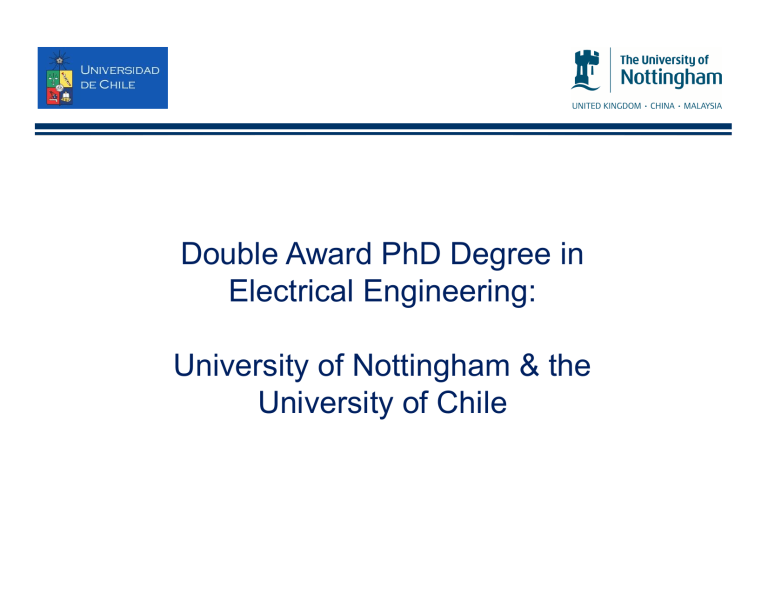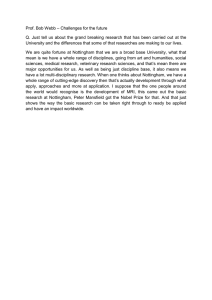Double Award PhD Degree in Electrical Engineering: University of

Double Award PhD Degree in
Electrical Engineering:
University of Nottingham & the
University of Chile
Double Degree Award
• Between the Electrical Engineering Departments,
University of Chile, University of Nottingham.
• Students successfully completing the programme will receive both UoN and UoChile PhD degrees.
• The University of Nottingham has three main research areas which will be described later.
Double Degree Award
• Students from the University of Chile can apply to this double degree program after the Qualification Exam.
Students are expected to spend at least one year in each of the institutions.
Double Degree Award
• The main contact for the programme at the
University of Nottingham is Professor Patrick
Wheeler, Faculty of Engineering.
Pat.Wheeler@ nottingham.ac.uk.
• The main contact for the programme at the
UoChile is Roberto Cárdenas Dobson, Faculty of
Physical and Mathematical Sciences, Department of Electrical Engineering.
rcardenas@ing.uchile.cl.
How to apply
• Candidates must specify their proposed area of research, and supply academic transcripts and two academic references when submitting their application.
• Applicants should apply to the partner at which they wish to begin their PhD studies. Then the application material will be shared with the other partner.
How to apply
• Admissions standards and eligibility shall be in accordance with the University of Nottingham and University of Chile admissions policies.
• Students are expected to spend at least one year in each of the institutions.
• Both institutions must agree on the admission and recruitment of students into this double degree PhD programme.
How to apply
• Candidates will pay the fees associated with the time they will spend in each university. The minimum time is one year.
• It is possible to obtain a scholarship to cover part of the fees. e. g. from the UK side.
• From the year 2013, students with a scholarship from “Becas Chile” may apply for funding for this double degree program.
(Maximum two years) .
The University of Nottingham
City of Nottingham
Population 300,000
Nottingham
City of Robin Hood and Brian
Clough
Manchester
Liverpool
Nottingham
130 miles
Bristol
London
UoN Profile
Top 1% worldwide and ranked 7 th overall in UK in 2008 RAE exercise.
• University consistently ranked in the UK's top 10 universities
• Ranked 5 th in Engineering
• Ranked in the world's top 70 universities by the Shanghai Jiao Tong and Times Higher
36,070 high calibre students with good completion record
• 31,972 UK based/12,848 international from 143 nations
• 5,974 post-graduate students
• One of the highest graduation employment rates in the country
7,000 staff
– a major employer and regional citizen
• Contributes £400 Million annually to the local economy
• Campuses - 4 in Nottingham, 1 in China, 1 in Malaysia.
Engineering at Nottingham
• 100 years experience of teaching engineering
• Research excellence underpins and animates all our teaching
• All programmes rated excellent in independent UK government review
• State-of-the-art laboratories
• World-leading research institutes
• Around 620 staff including
~ 210 academics
Engineering at Nottingham
• 4,092 students includes:
• 3,028 undergraduates
(34% overseas)
• 1,064 postgraduates
(68% overseas)
• Total research portfolio ~ £100 million
Research
•
2008 Research
Assessment Exercise
97% of research in the
Faculty of Engineering is of international quality, with over 75% defined as world-leading or internationally excellent
• The results place us in the UK ’s top five universities for engineering
Research
The Engineering Faculty
Faculty of
Engineering
Materials,
Mechanics and
Structures
Infrastructure
& Geomatics,
Architecture
& Urbanism
Electrical
Systems and Optics
Manufacturing
Energy and
Sustainability
Applied Optics
George Green
Institute for
Electromagnetic
Research
Power Electronics
Machines and
Control
Electrical Systems and
Optics Division
Bringing innovation in science and technology to the generation and use of electrical energy, including renewable energy, to high speed information processing and pervasive computing.
Research strengths
- Power electronics/machines/control
- Biophysics
- Electromagnetic simulation
- Imaging and optical science
- Photonic engineering
- Ultrasonics
Electrical Systems and
Optics Division
Neonatal heart monitor:
Improving the quality of care of new-borns.
SCORE: Stove for cooking refrigeration and electricity.
Power Electronics, Machines and Control Group
The Group
•
• 11 Academic Staff (7 full Professors)
»
100 researchers
•
• »
36 research fellows
»
60 PhD students
• 32 Nationalities
• £24m Research Budget
Focus Areas:
• Electrical Energy Conversion,
Conditioning and Control
• Power Electronics Integration, Packaging and Thermal Management
• Motor Drives and Drive Control
• Electrical Machines
PEMC: Some Examples …
Electrical Energy Systems
Transmission applications (HVDC)
Smart grids/Smart buildings
Energy storage interfacing
Transport
More electric aircraft
Road/rail vehicles
Marine systems
Industrial Drive Systems
And High Voltage Converters
Physics (CERN etc.)
Industrial microwaves
Electrostatic precipitators
George Green Institute For
Electromagnetics Research
•
•
•
•
•
• Named after the Nottingham Scientist George Green.
Focus on Electromagnetic Design in all its aspects.
Characterization, Modelling and Simulation of the electromagnetic behaviour of systems.
40 members (6 academic staff, 35 research fellows, visitors and PhD students)
Expertise:
• Electromagnetic modelling and simulation
• Electromagnetic Compatibility and Signal Integrity
• New materials and technologies
• Complexity in design
Examples of current projects:
• Interaction of radiating systems with biological tissues
• Magnetic resonance imaging
• Signal propagation in PCBs
• EMC modelling for aerospace applications
• New aerospace technologies
Summary
• The joint PhD in Electrical Engineering between UoN and UoChile is an exciting opportunity to engage in research in two different environments
• There are various options for areas of study- and this is likely to expand when the final agreement has been signed (imminent)
• Some initial support funding is available and this is currently being further investigated by both Universities
Questions about Nottingham?
For the PhD programme:
Pat.Wheeler@nottingham.ac.uk
In general (Nottingham, UoN life, PhD experience opinions, PEMC group questions etc.):
Alan.Watson@nottingham.ac.uk

